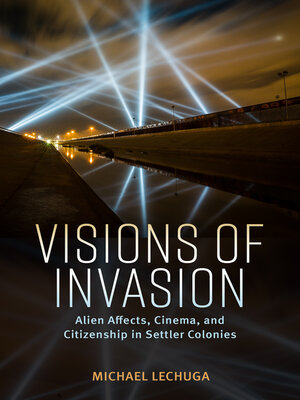Visions of Invasion
ebook ∣ Alien Affects, Cinema, and Citizenship in Settler Colonies · Race, Rhetoric, and Media Series
By Michael Lechuga

Sign up to save your library
With an OverDrive account, you can save your favorite libraries for at-a-glance information about availability. Find out more about OverDrive accounts.
Find this title in Libby, the library reading app by OverDrive.



Search for a digital library with this title
Title found at these libraries:
| Library Name | Distance |
|---|---|
| Loading... |
Visions of Invasion: Alien Affects, Cinema, and Citizenship in Settler Colonies explores how the US government mobilizes media and surveillance technologies to operate a highly networked, multidimensional system for controlling migrants. Author Michael Lechuga focuses on three arenas where a citizenship control assemblage manufactures alienhood: Hollywood extraterrestrial invasion film, federal antimigration and border security legislation, and various immigration enforcement protocols implemented along the Mexico–United States border.
Building on rhetorical studies, settler colonial studies, and media studies, Visions of Invasion offers a glimpse at how the processes of alien-making contribute to an ongoing settler colonial project in the US. Lechuga demonstrates that popular films—The War of the Worlds, Predator, Men in Black, and more—participate in the production of migrants as subjective terrorists, felons, and other noncitizen personae vilified in public discourse.
Beyond just tracing how alien invasion narratives circulate in popular media, Lechuga describes how the logics motivating early US colonists materialize in both the US's citizenship control policy and in some of the country's most popular texts. Beneath each of the film franchises and antimigrant political expressions described in Visions of Invasion lies an anxious colonial logic in which the settler way of life is seemingly threated by false narratives of imminent invasion from abroad. The volume offers a deep dive into how the rhetorical figure of the alien has been manufactured as a political subjectivity, one that plays out the anxieties, guilts, and fears of colonialism in today's science fiction landscape.
Building on rhetorical studies, settler colonial studies, and media studies, Visions of Invasion offers a glimpse at how the processes of alien-making contribute to an ongoing settler colonial project in the US. Lechuga demonstrates that popular films—The War of the Worlds, Predator, Men in Black, and more—participate in the production of migrants as subjective terrorists, felons, and other noncitizen personae vilified in public discourse.
Beyond just tracing how alien invasion narratives circulate in popular media, Lechuga describes how the logics motivating early US colonists materialize in both the US's citizenship control policy and in some of the country's most popular texts. Beneath each of the film franchises and antimigrant political expressions described in Visions of Invasion lies an anxious colonial logic in which the settler way of life is seemingly threated by false narratives of imminent invasion from abroad. The volume offers a deep dive into how the rhetorical figure of the alien has been manufactured as a political subjectivity, one that plays out the anxieties, guilts, and fears of colonialism in today's science fiction landscape.







